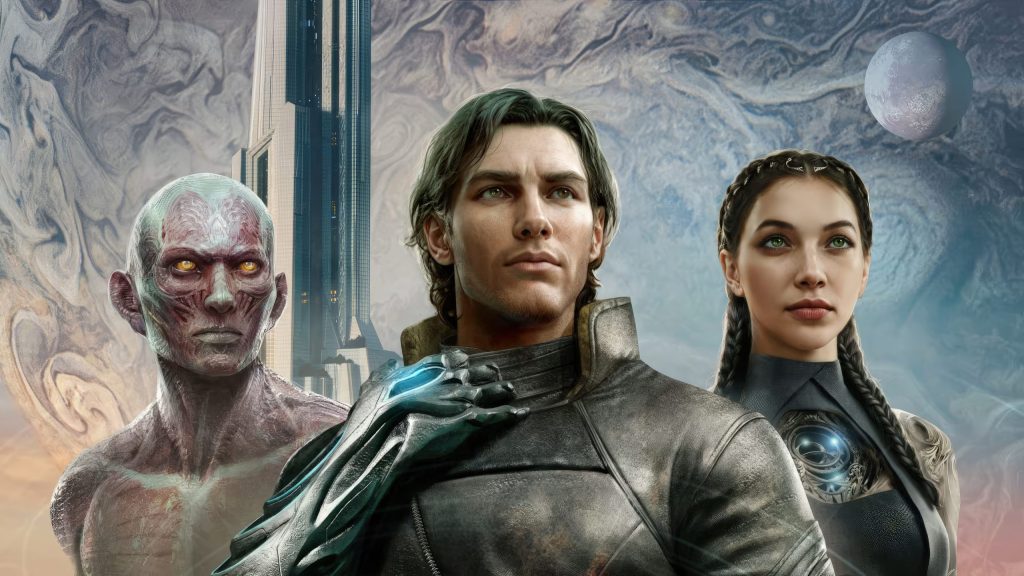Filled with intergalactic politics and intense Sci-Fi action, Peter F. Hamilton’s latest novel, Exodus: The Archimedes Engine, is much more than a simple video game tie-in.
Exodus: The Archimedes Engine
Written By: Peter F. Hamilton
Published By: Random House Worlds
Release Date: September 17, 2024
Purchase [Affiliate]: https://amzn.to/3TjtxWX
While we’re still not sure exactly when we’ll be able to dive into the upcoming Sci-Fi RPG, Exodus, eager players can immerse themselves within that vast universe thanks to Exodus: The Archimedes Engine from Peter F. Hamilton. Don’t mistake this as some simple video game tie-in novel, however. Archimedes Engine tells a wholly original story, featuring none of the characters you’ll encounter in the game (and technically in a different part of the galaxy). The result is a compelling space opera anyone can enjoy, while introducing gamers to the universe/lore in a way that won’t detract from the game’s story.
Set roughly 40,000 into the future after humans departed Earth on gigantic arkships, humanity has settled in the Centauri cluster and…evolved (for lack of a better word). Through a combination of genetic science and robust technology, they’ve transformed into Celestials. More alien than human, the Celestials rule humanity—and the still emerging ark ships—via a galaxy encompassing feudal system.
While things are generally peaceful, more and more humans are finding themselves chafing under the status quo. As such, Finn (a privileged human from a family meant to ensure Celestial rule) finds himself embroiled in the middle of a millennia-spanning revenge conspiracy between beings who are practically gods.
I’m going to be honest, even if I weren’t avoiding spoilers (I am), it would be difficult to sum up The Archimedes Engine. More than that, it took a while before I really figured out what the story being told was. Ostensibly, it’s about Finn working to find his own way in the galaxy, which means becoming a “Traveler.”
But there are a host of characters involved in the main story that takes place over a few decades. The story jumps around between them all, and even a couple hundred pages in, I felt like I knew a lot about the characters and what they were currently doing…but not what the overall story was.
Initially, I was a bit frustrated by this. Don’t get me wrong, I found myself unable to put the book down and enraptured by the events taking place. Yet so much of it felt like a bunch of disparate elements of pure world-building (just random slice of life stuff), instead of building to something.
I can’t say exactly when it happens, but later on, there’s a shift. What becomes clear is the story is something more along the lines of a noir/mystery. As the story moves along, you come to understand that the various god-like beings who are scheming for their own machinations are having their strings pulled by something even greater. The revelation had me revisit some of those earlier chapters and my initial thoughts on them; and I realized how many clues/details are sprinkled throughout.
It’s an impressive feat of writing. Not only does Hamilton craft the intricacies of the civilization we’re currently dealing with, but he establishes 40K years worth of lore and background that manage to add to the events centered in the novel. All of that, while still seeding crucial character details and plot clues that pay off hundreds of pages later.

We should probably talk about the elephant in the room…because that’s what this book feels like. The Archimedes Engine is a beefy lad that, at times, was genuinely tough to hold while reading the ARC. More than it’s hefty page count and small-ish font, the prose can be a little dense. It leans more into the harder science fiction aspect of things, which makes for some highly technical world-building and exposition.
As such, getting started can feel a bit daunting. I’m not going to sit here and tell you it’s not a long read—it is. However, it manages to balance out the heavier exposition with a style and characters that are easy to relate to. Getting the deluge of information through them, feels parsed in a way that’s easier to follow even while knowing that these are meant to be “higher concepts.”
Thankfully, it’s not long before you fall into a regular cadence with the novel’s prose and the tech/culture aspects become second nature to understand. It’s not a simple feat, but something Hamilton has always excelled at in his writing. Even as he takes his time with all the world-building elements, he endears us to the characters we’re witnessing it through; making them come alive in unique ways. Thus, when the “main part” of the story kicks in, you’re so invested in the characters and overall world that it’s tough to put down.
It’s storytelling at the grand level, much akin to things like George R.R. Martin’s Game of Thrones. Or, perhaps the more apt analogy here are the Expanse books. Regardless, the point is the novel is massive, but also compelling in ways that are hard to quantify. Even as a look back on the book and try to think about how it could be trimmed down, it all feels too essential to the characters and where they end up by the final chapter.
Exodus (the game) is easily one of my most anticipated upcoming projects and The Archimedes Engine has only managed to make me more excited. It’s a fantastic gaming tie-in in that I simply want to immerse myself even more within the world/universe crafted, even as it works as a standalone novel every Sci-Fi fan can enjoy.
While the size of the novel can feel daunting at first, the writing and characters are so instantly engrossing that it’s hard to put down. By the time it all wraps up, you’ll find yourself wishing for more.





